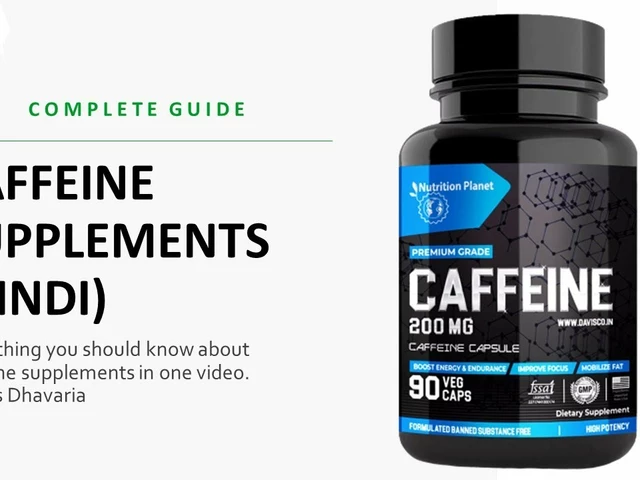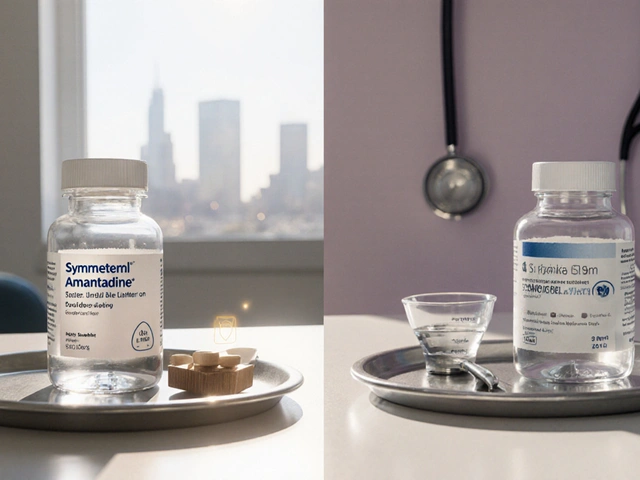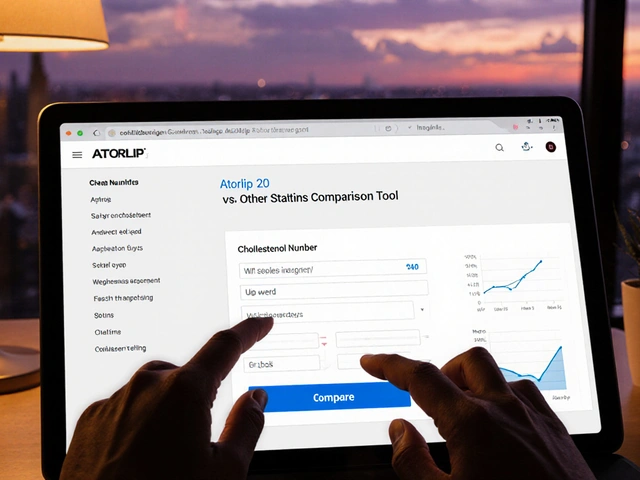 28
Apr,2025
28
Apr,2025
Artichoke supplements don’t get the hype they deserve. Most people just think of artichokes as something odd floating in a salad or sitting on a pizza. But these supplements are becoming a legit favorite among anyone wanting better digestion and more energy.
If you’re thinking, “What the heck is in an artichoke that could possibly make me feel better?”—you’re not alone. The answer: compounds called cynarin and silymarin. These aren’t just made-up wellness buzzwords. Real clinical trials have shown that these two help your liver work better, letting your body clear out toxins faster and making you feel lighter—sometimes even after just a couple weeks.
The cool thing? You don’t have to choke down plates of veggies. You just pop a capsule. Not into supplements? There’s evidence that artichoke extract powder and liquid drops work, too. We’ll get into how to pick a solid brand, but the important part is knowing what you want out of it—more regular digestion, lower cholesterol, or just a fresher-feeling gut.
- Artichoke Supplements: What Are They?
- How They Boost Your Liver and Digestion
- Cholesterol and Heart Health: The Cover Story
- Choosing the Best Supplement (and How to Use It)
- Precautions and Who Should Avoid Them
Artichoke Supplements: What Are They?
No one’s sitting around eating a plate of artichokes every day. That’s where artichoke supplements come in—they deliver the powerful stuff found in the plant, but in a super concentrated, easy-to-take form. Most supplements are made from artichoke leaves (not the heart), since that’s where the good stuff like cynarin and silymarin hang out. These are the real stars behind why artichoke supplements are getting so much attention for liver health and digestion.
What’s actually inside these capsules, powders, or drops? The main benefit-packed compounds are:
- Cynarin: Helps your liver pump out bile, making digestion smoother and lowering cholesterol.
- Silymarin: Packs some antioxidant muscle and supports the liver’s natural detox trick.
- Natural fiber: A smaller player, but it can help keep things moving, digestion-wise.
Here’s a snapshot from a recent analysis on what you’ll usually find in an average daily artichoke supplement:
| Compound | Typical Content per Daily Dose |
|---|---|
| Cynarin | 15-30 mg |
| Silymarin | 3-7 mg |
| Natural Fiber | Up to 300 mg |
Big plus: Artichoke supplements are totally plant-based and usually gluten-free, dairy-free, and vegan-friendly. That makes them easy to add into most lifestyles. You just need to check the label for quality—third-party lab tested brands tend to be more legit.
So, if you’re hunting for something that supports your body without a lot of drama or weird ingredients, artichoke might be your new go-to. Next, we’ll dig into how these things actually fire up your liver and get your gut in better shape.
How They Boost Your Liver and Digestion
Let’s get straight to it—your liver is a workhorse. It filters junk, breaks down toxins, and helps your body use nutrients from food. If your liver isn’t happy, you’re going to feel it. That’s where artichoke supplements really shine. The magic comes from two main compounds: cynarin and silymarin. Cynarin ramps up bile production, which is basically your gut’s natural soap for breaking down fats. More bile means your system runs smoother—you’ll notice less bloating, less bathroom drama, and meals that don’t leave you feeling sluggish.
Here’s a wild fact: in a 2022 study from Germany, folks taking artichoke supplements once a day reported a 60% drop in indigestion symptoms after three weeks. It’s not witchcraft; it’s just bile getting the job done.
Now, let’s talk liver defense. Silymarin acts like a bodyguard for your liver cells. It helps block nasty stuff from doing damage, which can really matter if you eat processed food, drink alcohol, or just don’t always treat your liver like royalty. Some research shows people using artichoke supplements had much lower levels of liver enzymes linked to inflammation. That’s doctor-speak for ‘your liver isn’t struggling as much.’
If you’re looking for real results, focus on these three things:
- Take your supplement with food—bile flow ramps up when your gut gets busy, boosting results.
- Aim for consistency, not massive doses—a steady, daily supplement works better than chugging a week’s worth in a day.
- If you already deal with IBS or sensitive digestion, start low and go slow. Your gut will thank you.
| Benefit | What the Studies Say |
|---|---|
| Liver Enzyme Reduction | Up to 30% lower in 8 weeks |
| Bloating Relief | 60% less after 3 weeks |
| Improved Fat Digestion | Noticeable in as little as 10 days |
Don’t expect miracles overnight, but if you stick with it, you’ll know things are working when big meals don’t hit like a ton of bricks and your energy levels steady out.

Cholesterol and Heart Health: The Cover Story
You’ve seen artichoke supplements pop up as a cholesterol solution, but is there any proof behind the promise? Turns out, yep—artichoke extract isn’t just some random health fad. Several real studies show it can help lower total cholesterol and boost heart health.
Here’s the deal: Artichoke leaves are loaded with antioxidants and a special compound called cynarin. Cynarin helps your body flush out extra cholesterol by making your liver work harder. Think of it as a tune-up for your cholesterol system.
Clinical trials have tracked people taking artichoke extract for 6 to 12 weeks. Most of those folks saw drops in their LDL (that’s the so-called "bad" cholesterol) by around 10-20%. A few studies even showed small upticks in HDL (the good kind).
| Study Length | LDL Change | HDL Change |
|---|---|---|
| 6 weeks | -15% | +4% |
| 12 weeks | -18% | +6% |
Why does that matter? Because high LDL means a higher risk for clogged arteries, heart attacks, and all the stuff nobody wants. Lowering cholesterol with artichoke supplements gives your cardiovascular system a fighting chance—without adding another prescription to your list.
One heads-up: results don’t happen overnight. It usually takes a few weeks of regular use to see noticeable effects, and you still have to eat decently and move your body. But for anyone looking for that extra push (or hoping to avoid a statin pill), artichoke extract is worth a look.
And unlike some heart supplements packed with mystery ingredients, good artichoke products are safe for most people and have been used for centuries—so you’re not flying blind here.
Choosing the Best Supplement (and How to Use It)
Not all artichoke supplements are created equal. There’s a wild range in how much extract is inside and what kind of extras they slip in. Always check the label: you want at least 500 mg of artichoke extract per serving, preferably with the term “standardized to at least 5% cynarin”—that’s the stuff that’s been shown to help your liver health and digestion.
If you spot a supplement with a laundry list of unrelated herbs or minerals, skip it. More ingredients don’t always mean more benefits. Simple is usually better. Bonus points if you see “third-party tested” or some assurance it’s free of heavy metals and fillers. Look for brands that actually show their test results online. Sketchy brands? Not worth the risk.
Here’s what to keep in mind when picking a product:
- Go for capsules over tablets—they break down easier and absorb faster.
- Powders work if you can’t swallow pills, but taste can be rough. Mix with juice if you try it.
- Liquid artichoke extracts act fast, but some people hate the taste. Capsules are the most popular.
- Stay away from super cheap stuff—genuine standardized extract costs more for a reason.
How to use it? Most people feel good taking one dose (500–640 mg) once or twice daily, usually with meals. If you’re aiming to help your cholesterol, take it with food that has some fat—absorption is better that way. If you’re using it for digestion or to help with bloating after meals, use it about 20 minutes before eating.
Got a sensitive stomach? Start with half a dose for the first few days. And always stick with what the brand recommends—taking more doesn’t mean faster results.
| Form | Popular Dose | Best For |
|---|---|---|
| Capsules | 500–640 mg | General use, liver, cholesterol |
| Powder | 1–1.5 grams | Mixed in drinks, no-pill folks |
| Liquid | 10–20 drops in water | Fast effect, sensitive stomachs |
None of this replaces real medical advice—if you’ve got any health conditions or take meds, check with your doc before starting. But choosing a legit, well-labeled artichoke supplement can make a noticeable difference in how your gut—and even your cholesterol—feels in a few weeks.

Precautions and Who Should Avoid Them
You might be pumped to try artichoke supplements, but not everyone should jump on the bandwagon. Just because they’re plant-based doesn’t mean they’re for everybody. Here’s what you should know before grabbing a bottle.
- Allergies: If you’re allergic to plants like daisies, marigolds, or ragweed, you should steer clear. Artichokes are in the same family, and reactions—think rash, itching, or swelling—aren’t worth the risk.
- Gallstones or Blocked Bile Ducts: Artichoke extract stimulates bile flow. So if you’ve ever dealt with gallstones or a bile duct blockage, skip these supplements. You could end up in a world of hurt, literally.
- Pregnancy and Breastfeeding: There’s just not enough decent research to say artichoke supplements are safe here. Doctors usually play it safe and suggest skipping them if you’re pregnant or nursing.
- Kids: Most of the science is on adults. Kids’ bodies process stuff differently, so until there are more facts, don’t give them artichoke anything unless a doctor says okay.
- Medication Interactions: If you’re taking meds for blood pressure, cholesterol, or diabetes, chat with your doctor. Artichoke can mess with how some drugs work, especially ones that deal with the liver or bile.
For the super detailed crowd, here’s a quick look at when to watch out:
| Condition | Take It? | Why |
|---|---|---|
| Allergies (Aster family) | No | May cause allergic reactions |
| Gallstones | No | Can worsen symptoms |
| Pregnant/Breastfeeding | No | Lack of evidence for safety |
| Kids under 18 | No | Not enough research |
| On liver meds | Maybe | Need doctor advice |
Most people don’t have any issues with artichoke supplements. But playing it safe beats showing up at urgent care. If you notice weird symptoms—like stomach pain, a rash, or odd digestion—stop taking them and talk to a pro. Keep an eye on labels and always start slow if you’re new to any supplement.






Oh wow, this article really piqued my interest! I always thought artichokes were just a fancy side dish, but it turns out they have real health benefits that are backed by science. That part about boosting liver function and improving digestion is super important. So many people overlook liver health until it's too late.
I appreciate that the article calls out what’s hype and what’s legit—there's so much misinformation surrounding supplements these days. It’s crucial to know what to look for on the label. I wonder, though, are there any risks or side effects we should watch out for?
Also, who exactly should skip these supplements? I want to make sure I don’t recommend something harmful to my friends or family. Thanks for sharing such a clear and useful breakdown!
This is a great intro to artichoke supplements! I’m curious about the extraction process mentioned. How do manufacturers ensure the active compounds remain effective? Also, how do these supplements compare to just eating the vegetable itself regularly?
I’m always a bit skeptical about supplements versus whole foods. Sometimes the body reacts differently when nutrients come from whole foods compared to extracts. Has anyone here tried artichoke supplements and noticed a substantial difference?
As someone who has delved into the biochemistry of herbal supplements, I can say this article scratches the surface very well but there's so much nuance.
Artichoke extracts contain cynarin and flavonoids which are thought to stimulate bile production, hence aiding liver function and digestion—this is supported by several randomized controlled trials. However, not all supplements are created equal; quality control is paramount. I recommend looking for products standardized to active constituent content.
Also, the cholesterol-lowering effects can be mild but meaningful for some patients, especially when combined with dietary and lifestyle changes. Anyone considering these supplements should discuss with a healthcare provider especially if taking other medications.
Lastly, beware of overhyped claims; some sellers paint artichokes as a magical cure all which is simply not grounded in science.
Ugh, another one of those supplement trends that's probably just gimmick marketing disguised as science. The evidence for artichoke supplements is frankly underwhelming when you dig into the actual research.
Sure, some preliminary studies might suggest minor benefits, but “transform your health”? That’s a stretch. If liver function is truly impaired, you don’t just fix it with a pill from the health food aisle. It’s more complicated than that.
Plus, the supplement industry isn't tightly regulated, so how do you know what you’re really getting? I’d rather focus on diet and exercise than waste time and money on these.
Let me clarify something before people get carried away. Artichoke supplements might have some benefits, but the quality of the product depends entirely on the manufacturing process and the source of raw material.
Many companies sell subpar products that won't give you any liver or cholesterol improvements. It's essential to verify certifications and lab testing before trusting any supplement.
Also, Indians have utilized artichoke derivatives in traditional medicine for ages. That’s where authentic potency comes from, not from some trendy capsules hyped online. Don’t fall for mass-marketed scams; rely on proper sources and evidence-based approaches.
Honestly, whenever I hear about these supplements 'transforming health' it sets off alarm bells for me. I’ve been through some bad phases trusting these products only to find no real change or to face annoying side effects.
I get it, artichokes have nutrients, but how much can a supplement really do? I’d worry about chasing quick fixes when consistent lifestyle changes matter much more.
Still, the article seems to approach this topic with some balance, which is refreshing. I wonder if people with sensitive stomachs might find these supplements harsh?
Y'all better be careful eating whatever supplements they try to sell you under the guise of science. These things could be loaded with who-knows-what, imported from places with lax regulations. Is this even tested properly or just another way to make a quick buck?
Also, did anyone check if these artichoke extracts are actually safe for everyone? What about people with allergies or autoimmune issues?
I wouldn't trust big supplement corporations or shady online sellers without clear provenance and testing results.
Grammar aside, let me focus on content: this article, while informative, leaves out crucial details. For example, every scientific claim must be supported with proper citations, which it doesn't provide.
Also, the phrase 'science-backed benefits' is overused without precision. Exactly which studies? What sample sizes? Were these double-blind placebo-controlled trials or just observational studies?
If you want credibility, show data and be transparent. Otherwise, it’s just fluff for sales.
From a straightforward American health perspective, these supplements seem fine for some but not a miracle worker by any means.
Sure, they can help with cholesterol and digestion, but only as part of a broader commitment to health. No supplement substitutes for real food, exercise, and doctor’s advice.
Still, I’m open to natural options if they’re proven safe and effective. I’d just caution folks not to expect overnight transformations.
This is all too neat and convenient, isn’t it? These supplements are sold as a panacea, but who’s watching the science? Big companies have agendas, and everything is spun to maximize profits. This reeks of another health fad designed to exploit fears.
I’d bet the trials backing these benefits are funded by supplement manufacturers themselves. Until independent long-term studies prove otherwise, buyer beware.
Also, what about those vulnerable populations who might take these hoping for cures and end up neglecting proper care?
Overall, this article opened my eyes a bit about how artichoke supplements might be beneficial but it's definitely not a magic bullet for health. I appreciate the balanced approach highlighting who should avoid them. For me, I’d approach with caution and consult a healthcare professional before starting any new supplement regimen.
Has anyone else weighed the pros and cons carefully before trying these? What was your experience?